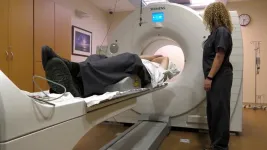(Press-News.org) A new study by researchers at Intermountain Health in Salt Lake City aims to determine the best method to screen and evaluate patients who are at risk of developing coronary heart disease and which patients would benefit from taking a statin medication to lower cholesterol.
Currently, cardiologists determine a patient’s need for a statin based on traditional risk factors, using the Pooled Cohort Equation (PCE), which calculates coronary risk by assessing the risk factors of age, sex, total and HDL cholesterol levels, blood pressure, and whether someone has diabetes and is a smoker.
However, a new approach to determining risk and selecting a statin is the use of the coronary artery calcium (CAC) score which is determined by taking a low-radiation dose image of the heart using computed tomography (CT) to look for calcium deposits in plaques in the heart’s coronary arteries.
Which approach is more effective? The new study aims to find out.
“Our study is now fully enrolled with over 5,600 patients, and in this abstract for the American College of Cardiology, we wanted to look at baseline characteristics and differences in statin prescribing recommendations,” said Jeffrey L. Anderson MD, principal investigator of the study and distinguished clinical and cardiovascular research physician at Intermountain Health.
“The question is: Can we do a better job in selecting people who need a statin for primary coronary risk reduction by using the coronary artery calcium score, rather than just putting coronary risk factors into an equation – that is, is it more effective to use direct imaging evidence of plaque burden or a risk probability. That’s what we’re aiming to find out,” he said.
The new study was presented on March 29 at the American College of Cardiology’s Annual Scientific Sessions meeting in Chicago.
The research is part of CorCal Outcomes, a large, randomized clinical trial at Intermountain Health that is comparing the Pooled Cohort Equation versus coronary artery calcium score guidance to initiate a statin prescription for primary prevention of coronary heart disease.
Since 2019, Intermountain heart researchers have enrolled 5,615 patients into the study, with patients having an average age of 64.1 years old, and 51.3% of the study subjects being women.
“This CorCal Outcomes study has been a system-wide, eight-year effort to complete enrollment,” said Dr. Anderson.
Intermountain patients at risk of coronary disease were invited to enroll in the study, and those agreeing to participate were randomized into two groups: those assessed using the Pooled Cohort Equation or by a coronary artery calcium score.
The results of scoring by their assigned risk assessment tool were sent in letters to their personal physicians, including whether a statin was recommended based on a high-risk score.
Patients in the two groups in the study were found to have very similar baseline characteristics. However, researchers found that the rate of statin medication recommendations were different.
The study is expected to conclude in early 2026, at which time a comparison of outcomes, including deaths, heart attacks, strokes, and revascularizations during up to 7 years, and an average of over 4 years, of follow-up will be made.
A recommendation to start a statin was made much more often based on the Pooled Cohort Equation. In the PCE group, 50.7% of patients were recommended a statin, with another 21.7% to be considered for one. In contrast in the CAC group, only 22.3% of patients were recommended a statin.
This large difference in statin recommendations appears to be explained by the strong influence of older age in recommending a statin by the Pooled Cohort Equation and, in contrast, the frequent finding of a zero or low CAC score in many older patients, leading to a no-statin recommendation in them.
Knowing which score is most effective is important, said Dr. Anderson, so that physicians can get the statin drugs to the right people, and not prescribe statins to those who don’t need it.
This is especially important considering that statins entail costs and can have side effects, including muscle aches and an increased risk of diabetes.
“We know there’s a huge difference in prescribing recommendations, and next year we are anxious to see the impact of these differences on outcomes. These findings can have a huge impact on how we practice preventive medicine in the future and how many and whom we put on a statin or other lipid-lowering drugs,” said Dr. Anderson.
###
END
Who needs a statin? New study compares prescribing recommendations based on traditional risk factors vs. coronary artery calcium scoring
2025-03-29
ELSE PRESS RELEASES FROM THIS DATE:
Finerenone and atrial fibrillation in heart failure
2025-03-29
About The Study: The efficacy of finerenone was consistent regardless of atrial fibrillation status in this study. New-onset atrial fibrillation was associated with a substantially higher risk of subsequent outcomes.
Corresponding Author: To contact the corresponding author, John J. V. McMurray, MD, email john.mcmurray@glasgow.ac.uk.
To access the embargoed study: Visit our For The Media website at this link https://media.jamanetwork.com/
(doi:10.1001/jamacardio.2025.0848)
Editor’s Note: Please see the article for additional information, including other authors, ...
Low coronary artery calcium score is associated with an excellent prognosis regardless of a person’s age, new study finds
2025-03-29
Having a coronary artery calcium (CAC) score of zero has generally been accepted as a marker of a very low risk of having a cardiac event within the next five years. However, age is a strong contributor to coronary risk, with risk increasing markedly as people age.
Whether age-related risk factors diminish the low risk predicted by a zero coronary artery calcium score has been uncertain – until now.
A large new study of more than 40,000 patients from heart researchers at Intermountain Health in Salt Lake City finds that a zero coronary artery calcium score continues to be an accurate indicator of a low risk for a coronary ...
Groundbreaking consensus statement on conduction system pacing released: a major milestone in the evolution of pacing therapy
2025-03-29
Vienna, 30 March 2025– The European Society of Cardiology (ESC) has released a groundbreaking consensus statement on conduction system pacing (CSP), marking a significant milestone in the evolution of pacing therapy. The document was officially presented today at the EHRA 2025 congress in Vienna and simultaneously published in EP Europace.
For over 50 years, right ventricular pacing has been a standard treatment for slow heart rhythms. However, in some patients, this approach can lead to reduced heart function and even heart failure. Furthermore, biventricular pacing ...
Nuclear monitoring system suggests landslide cut off internet in west Africa
2025-03-29
Hydroacoustic signals captured by the world’s international nuclear monitoring system suggest an underwater landslide may have broken communications cables and disrupted internet traffic in west African countries for several weeks in March 2024.
Researchers used data collected by hydrophones installed by the International Monitoring System of the Comprehensive Nuclear-Test-Ban Treaty Organization (CTBTO) to determine the location of the possible landslide, placing it along the steep slopes of Trou Sans Fond Canyon offshore of Ivory Coast.
The proposed landslide corresponds with the timing and location of four broken cables in the canyon, according to Vaibhav Vijay Ingale of UC ...
PNNL scientist elected AAAS fellow
2025-03-29
RICHLAND, Wash.—Chemist Zheming Wang, whose research largely focuses on the chemistry underlying radioactive and advanced energy materials, as well as critical elements, has been elected as a Fellow of the American Association for the Advancement of Science—the highest honor the society bestows. AAAS is the world's largest multidisciplinary scientific society with a mission to “advance science, engineering, and innovation throughout the world for the benefit of all people.”
AAAS notes that Fellows are celebrated for contributions that span ...
American College of Cardiology recognizes five JACC Rocket Fuel Consultants
2025-03-28
The American College of Cardiology will honor five cardiovascular experts with the JACC Rocket Fuel Consultant Award for fueling JACC’s mission to provide high-quality, pertinent research and improve heart health for all. The awardees will be recognized during ACC’s Annual Scientific Session (ACC.25) in Chicago.
This is the first year of the JACC Rocket Fuel Consultant Award. The JACC consultant program invites experts to provide comprehensive assessments of a submission’s quality, importance and impact. Their contributions streamline the review process and ensure that JACC maintains its commitment to high-quality research.
The 2025 JACC Rocket ...
American College of Cardiology, Association of Black Cardiologists recognize three Merck Research Fellowship awardees
2025-03-28
The American College of Cardiology and the Association of Black Cardiologists have selected three recipients of the Merck Research Fellowship Award, fostering the next generation of cardiovascular investigators. Awardees will be recognized during the American College of Cardiology’s Annual Scientific Session (ACC.25) in Chicago.
The ACC/ABC Merck Research Fellowship provides three, one-year fellowships totaling $100,000 to support one year of cardiovascular research. The year of research began in December 2024 and will run through December 2025.
This year’s recipients and their research titles are:
Temidayo ...
JACC to recognize 2025 Simon Dack Award recipients, Elite Reviewers
2025-03-28
JACC, the flagship journal of the American College of Cardiology, has awarded two peer reviewers with the Simon Dack Award for Outstanding Scholarship and seven peer reviewers with Elite Reviewer awards.
Named after the founding editor of JACC, the Simon Dack Award recognizes outstanding peer reviewers whose contributions have helped JACC achieve its mission to publish new and important clinical research. The 2025 recipients are:
Kershaw V. Patel, MD, Houston Methodist Hospital, Houston
Robert S. Rosenson, MD, Mount Sinai Fuster Heart Hospital, Icahn School of Medicine at Mount Sinai, New York
The Elite Reviewers are peer reviewers ...
American College of Cardiology honors two recipients with the William A. Zoghbi Global Research Initiative Award
2025-03-28
This year, the American College of Cardiology will recognize Jennifer Mateo Soto, MD, and Opeyemi Olalekan Oni, MBBS, MSc, with the William A. Zoghbi Global Research Initiative Award. The awardees will be honored during ACC’s Annual Scientific Session (ACC.25) in Chicago.
First established in 2023, the William A. Zoghbi Global Research Initiative fosters innovations in cardiovascular research and aims to improve the care of people in low- to middle-income countries who at risk of or living with cardiovascular disease. Recipients of the award receive $25,000 to put toward an ...
JACC recognizes five recipients of the William W. Parmley Young Author Achievement Award
2025-03-28
JACC, the flagship journal of the American College of Cardiology, is recognizing five primary authors with the William W. Parmley Young Author Achievement Award, due to their exceptional research papers published in the journal.
The award, also known as the Parmley Prize, recognizes remarkable first-author publications by trainees in JACC. The award aims to elevate trainee-led research in JACC and put the spotlight on their contributions to cardiovascular science.
This year’s winners and their mentors are:
Aldostefano Porcari, PhD
National Amyloidosis Centre, Division of Medicine, University ...


